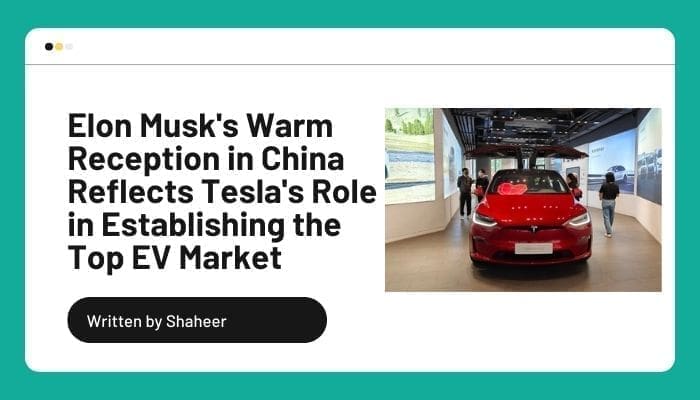Elon Musk’s Warm Reception in China Reflects Tesla’s Role in Establishing the Top EV Market
SHANGHAI—Top Chinese authorities greeted Elon Musk enthusiastically this week during a visit that demonstrated Tesla’s TSLA 2.15% increase; green up pointing triangle dedication to the country that it has helped drive to become a world leader in electric automobiles.

While many American executives are reconsidering their relationship with China in the face of rising geopolitical tensions, Musk used a flurry of meetings and the opportunity to praise Tesla’s Shanghai factory, which opened more than three years ago and now accounts for more than half of the company’s global output.
During a visit to Shanghai on Wednesday, Musk told employees that the cars are “not just the most efficient production, but also of the highest quality,” according to a video shared on Tesla’s Chinese social-media account.
Musk saw the updated Model 3 sedan, a yet-to-be-released mass-market variant that is being trial-produced in the factory, before flying out of the country on Thursday morning, according to people familiar with the situation. Tesla hasn’t updated its lineup in a while, and it’s facing increased competition from Chinese rivals.
According to people familiar with the subject, Musk met with Robin Zeng, chairman of China-based battery company Contemporary Amperex Technology, or CATL, on Tuesday over a 16-course meal at an exclusive Chinese restaurant in Beijing. According to the sources, the two executives discussed a potential battery project in the United States, but no solid plans were decided upon.
Musk’s visit piqued the imagination of Chinese internet users, where he is a celebrity. The trip was utilized by Chinese officials to boost commercial connections with the United States, despite the fact that Beijing has been cracking down on some foreign enterprises in the name of national security. Authorities have raided due-diligence firms and jailed employees, and China blacklisted several Micron Technology goods last month.
After meeting with China’s Foreign Minister Qin Gang on Tuesday, Musk informed Qin that Tesla was opposed to decoupling the world’s two largest economies. In a parallel to US-China relations, Qin stated that one must avoid “dangerous driving” and use the brakes when necessary. Musk also met with China’s top auto regulator, the commerce minister, and the Communist Party chief of Shanghai.
Requests for comment from Musk and Tesla were not returned. On her Chinese social media account, a Tesla executive shared the foreign ministry’s message.
Musk is the latest in a long line of American executives to visit China this year, with the country declaring that it is open for business following the relaxation of its border rules. Apple CEO Tim Cook and Pfizer’s Albert Bourla visited China earlier this year to meet with senior officials and tour local facilities.
Apple is one of the corporations attempting to lessen reliance on China amid political uncertainty by expanding production to countries such as India and Vietnam.
Tesla intends to develop new factories all over the world, but it is also doubling down on China, announcing in April that it intends to establish a second factory in Shanghai to make its Megapack energy-storage product.
Chinese policymakers encouraged Tesla to build its first factory, which opened in 2019, in order to help spark consumer demand for EVs and generate competition for domestic EV makers, which Beijing considered lethargic despite years of incentives.
It was successful. Tesla car exports from its Shanghai facility to Europe and Asia helped China overtake Japan in the first quarter of this year as the world’s largest vehicle exporter. China is the world’s largest EV market and is fast expanding as Tesla’s brand appeal has influenced more buyers to convert from gas-powered vehicles. A supply network created around Tesla is now supplying a wave of improving indigenous EV manufacturers.
“If you’re China, thank you Tesla for reawakening a sleeping market segment, retail consumers,” said Bill Russo, founder and CEO of Automobility, a Shanghai-based strategy and investment advisory firm.
Automotive executives who previously considered China as a follower of global automotive trends now see it as a trendsetter in electric vehicles. Foreign automakers have admitted that they must play catch-up. Both Musk and Ford CEO Jim Farley have stated that Chinese businesses are their main EV competitors.
Tesla’s contribution to China may be seen in the supply chain it has helped to establish. According to the corporation, its manufacturing in Shanghai is 95% localized.
According to people working for those companies, many Chinese EV makers prefer to source from Tesla suppliers because of the perceived halo effect of using manufactures that satisfy Tesla’s quality and production requirements.
According to its most recent annual report, CATL, the world’s largest EV battery manufacturer, relies on Tesla for 12% of its sales and distributes batteries to local EV manufacturers such as NIO, XPeng, and Li Auto.
Ningbo Xusheng Auto Technology, a provider of aluminum housings for batteries and motor systems, has been Tesla’s largest customer for nearly a decade. According to documents, its revenue share from Tesla fell to 34% last year from 54% in 2019, as the company supplied more to local EV companies such as NIO and China’s top-selling EV maker BYD.
Chinese competitors have adopted Tesla’s production method. Tesla die-casts the car frame in one piece for the Model Y, a manufacturing technology that decreases component utilization and weight, lowering costs and shortening vehicle assembly time.
According to those acquainted with the topic, the technology is now adopted by a group of Chinese EV manufacturers, including NIO and XPeng. The technology is used by NIO on its ET5 car. According to Wencan Group’s stock-exchange filings, it also sources from Tesla’s car-frame supplier.
Tesla now faces severe competition from Chinese competitors after igniting China’s EV market with two locally produced models. According to the China Passenger Car Association, domestic automakers sold 83% of all EVs in the country last year. Tesla’s market share has dropped from roughly 15% in 2020 to 10% last year.

